Divi and Elementor are two of the most popular page-builders for WordPress. Both are excellent drag and drop systems that can build practically any type of website. In this article we’ll take a look at both to help you decide which is best for you.
Overview
Here’s a look at each company.
What is Divi
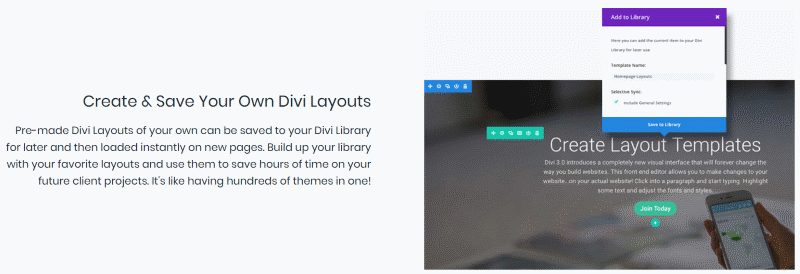
Divi is from Elegant Themes. It was founded by Nick Roach. Divi was developed in 2013 and was based on the Elegant Builder plugin they developed in 2012 for the purpose of providing a page-building platform using drag and drop modules.
Divi is available as both a theme and a plugin. It adds a drag and drop builder to the page and post editors. You can build layouts with sections, rows, and 46 modules, and customize each element. It has both a frontend and backend builder. The theme adds tools to the Customizer. The plugin works with any theme but doesn’t add the theme customizer.
What is Elementor
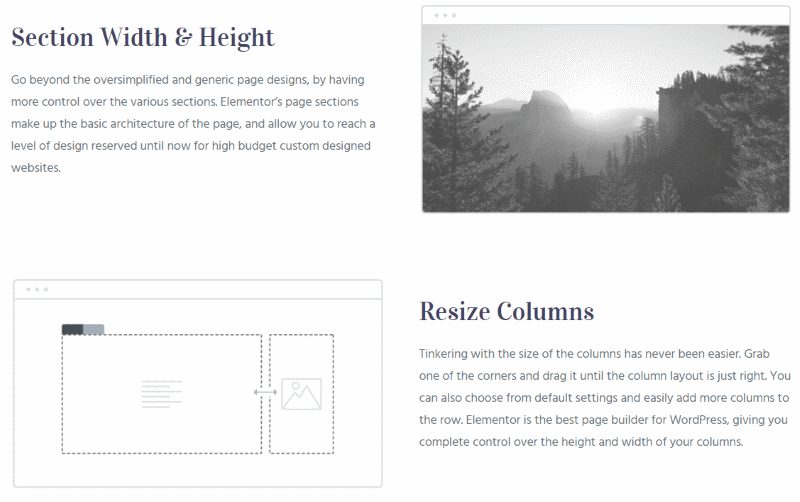
Elementor is a page-building plugin developed by Pojo Me Digital LTD. It was founded in 2014 by Yoni Luksenberg and Ariel Klikstein. They started developing the Elementor Page Builder in 2015 in order to create a fast, live, front-end editor for WordPress to help designers improve their design workflow.
Elementor is available as both a free and a pro version. The free version has 28 elements while the pro version has 59. It provides a blank canvas with no header or footer where you drop the design elements. The template library has over 100 templates that you can use. It’s multilingual and includes RTL. It includes under construction and maintenance mode.
The Differences Between Divi and Elementor
Let’s look at the differences between Divi and Elementor.
Pricing
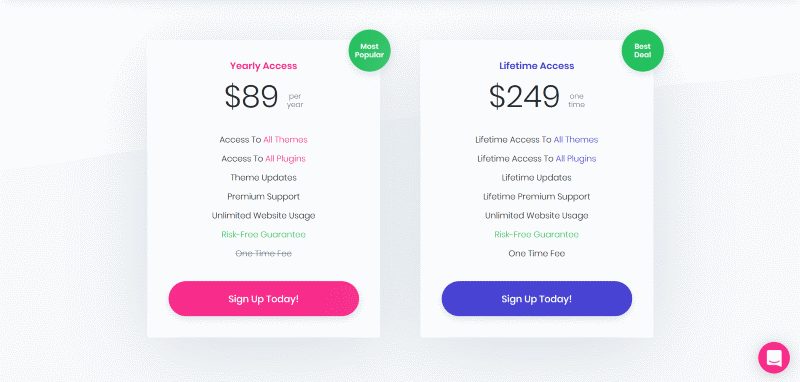
Divi is available with the Elegant Themes membership. There are two options. Both include unlimited use of all themes and plugins:
- Yearly Access – $89, includes one year of support and updates. If you cancel you keep your themes and plugins.
- Lifetime Access – $249, includes lifetime support and updates.
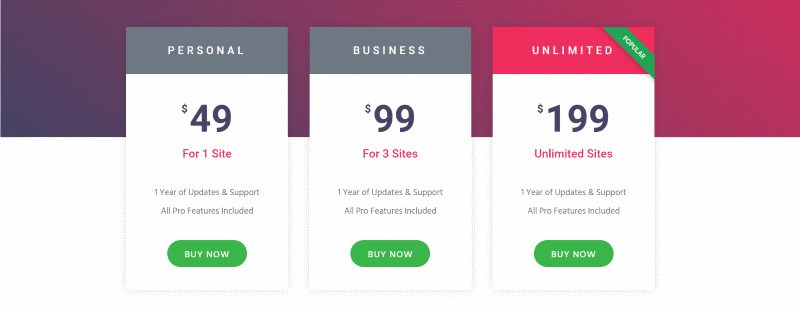
Elementor is available for free with limited features or in a pro edition with three purchase options. They have a 50% discount for renewing an active account.
- Free – limited features.
- Pro – includes pro features and 1 year of updates and support. It has 3 options:
- Personal – $49 for 1 site.
- Business – $99 for 3 sites.
- Unlimited – $199 for unlimited sites.
Support
Elegant Themes – support is provided through a ticket system, forum, and documentation. Video is built in to Divi. Yearly access includes one year. Lifetime access includes lifetime support.
Elementor – support is provided by a support team. Anyone can access the support documentation. Developer documentation provides lots of tutorials and reference material. Support is included with the one year subscription.
Community
Divi has a large community. The Elegant Themes blog has two posts per day with one post being dedicated to Divi. There are lots Facebook groups, websites, child themes, layouts, plugins, courses, videos, podcasts, and more.
Elementor’s community is smaller but it’s growing. The blog typically posts 2-3 articles a month. Many websites include tutorials for Elementor. There are several Facebook groups, third-party layouts, courses, and lots of videos.
Features
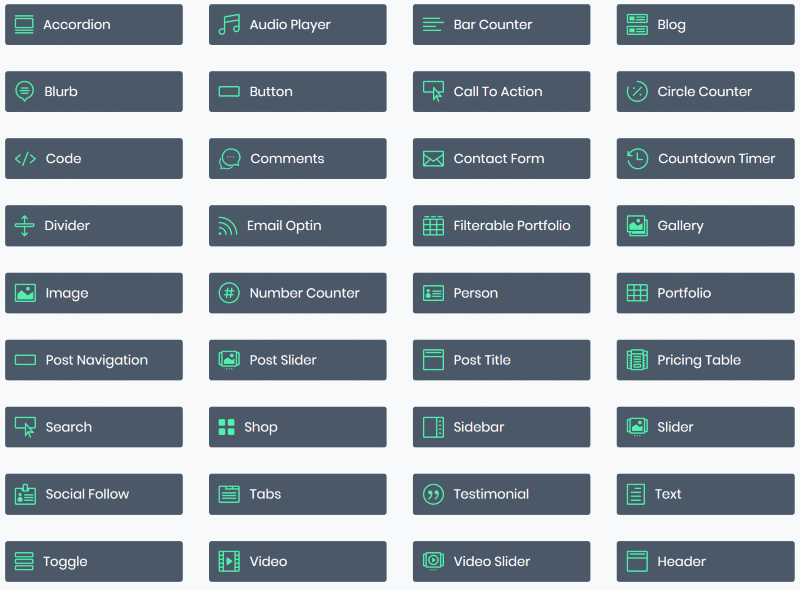
Divi has both a frontend and backend builder with 46 modules that you can place within rows and sections to create any type of layout you want. Customize each module, row, section, page, or the entire site with the theme customizer. It’s intuitive and easy for beginners but also includes advanced features for designers.
Create your own or use pre-made designs, add new features with plugins or code, and customize each element with CSS. Test your designs with a/b testing. It comes with several custom widgets. It’s multilingual and supports RTL. ET adds a free multi-page layout every week.
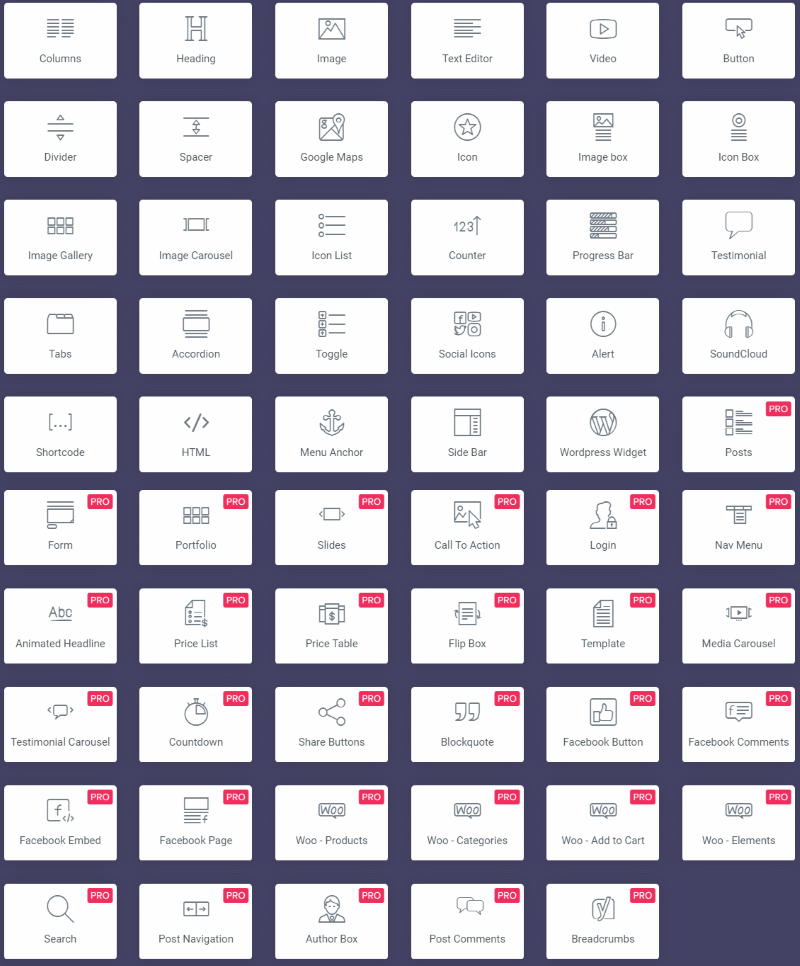
Elementor is a frontend builder with 59 elements in the pro version that you can place within sections to create your layouts. Create blocks or pages and customize each element individually. The intuitive designer includes elements and styling options are placed on the left of the screen while you build with any theme. You can close the designer to see your layouts in full-width.
Use premade layouts or create your own. Add your own code, build on mobile, customize with CSS, and more. Drag and drop any third-party widget within your layouts. It’s multilingual and supports RTL.
Conclusion
Both platforms are great choices. Here are my thoughts on choosing between them:
- Divi is excellent for those who want to create their own child themes, layouts, and plugins. There are lots of third-party products available to help you get started and customize your website even further.
- Elementor is an excellent choice for those who want to work with any theme. There are lots of layouts available and you can use any third-party widget within the layouts. Get started for free and upgrade to pro later.
Which do you prefer between Divi and Elementor? Let us know in the comments.

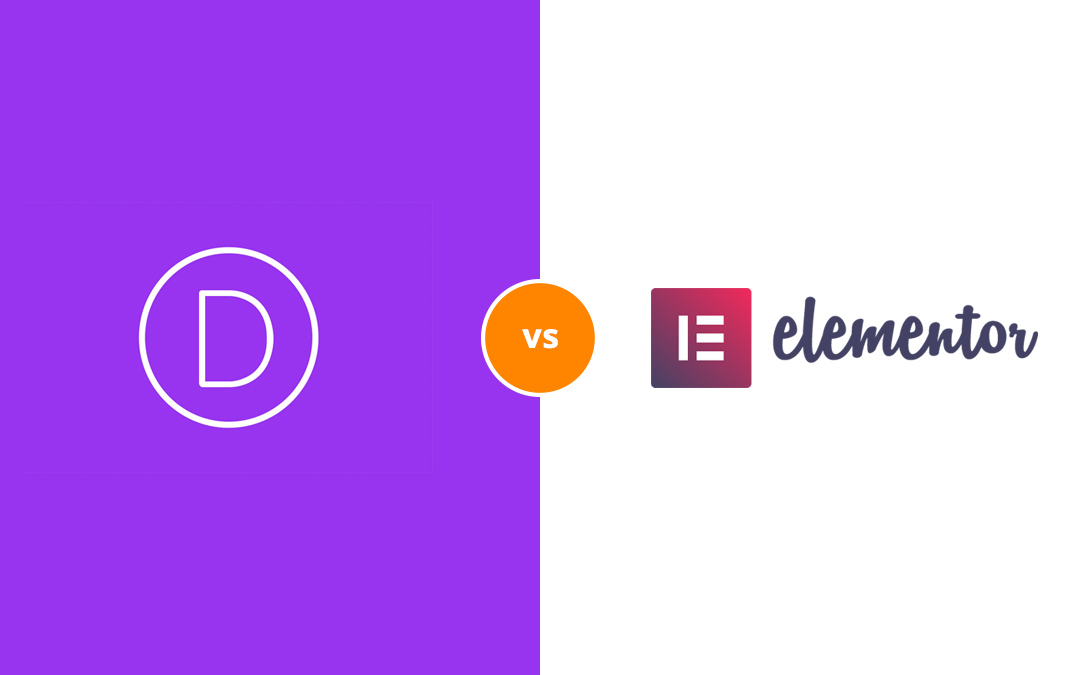
Divi has one really bad downside: if you ever need to switch your site to another framework/builder, you are doomed. The Divi code embedded deeply in your site content makes this almost impossible. Elementor is much more forgiving here (unless you used lots and lots of pre-built modules). Divi is also very slow as a lot of builder data has to be loaded while working on content. I found Elementor to be much faster. One thing I painfully miss in both is the option to save a single widget element (filled with content and settings) or a group of widgets as a template. You can only save whole sections containing your widgets. You can not group or combine several widgets within a section and move them to another position as a group or save them as a template. Very often you have to create a new widget for every kind of content and staple them within a section. If you have to move a group of content widgets that belong together into another section, you have to do it widget by widget by hand. You really should plan a page before building it, otherwise tinkering around will be really annoying. Drag and drop works fine in both tools.
Elementor better than Divi every day, this true. Divi just beautifull UI, good for create landing page
You should’ve learnt to use it then. To say it’s only good for building a landing page is a ridiculous thing to say and uninformed.
I’ve been a Divi user for three years and love it! However, I’ve recently started tinkering with Elementor in a search for a less “bloated” finished product. In my initial testing, it seems that the sites I build with Elementor are performing a bit faster out of the box with higher Google Page Speed index scores. Nothing scientific yet, but I’m planning to build the exact same design in both soon just to see if this holds true. Has anyone done any testing on this they they might like to share?
As a dev – Elementor is friendlier to create new plugins. In Divi you must use React Enviroment to create good module and if you want or created own js module in jQuery. In Elementor – jQuery only.
I think that someone in elegantthemes went too far with “pro” and “best js framework/lib”. 3 years ago there was angular, now react, next year? Vue?
And jQuery have large community and docs. And is much simplier (simple and have low learning curve).
I have found that the Divi Builder plugin des not seem to be able to break out of the content width of certain themes where Elementor doesn’t seem to have a problem with this. I have tested Elementor and I do like the way you can resize the columns on the fly. I would say that Oxygen Builder is better than Elementor but, it does not have any integration or work with Toolset Types & Views very well whereas an integration for Elementor for Types & Views has just been released.
Overall though I still think that generally Divi is a far better builder, has the best user experience, and has one of the better integrations with Toolset Types. You can build templates for Custom post types or even pages and posts from a central library. You can assign custom field groups to these CPTs then interpolate them into the the Toolset Divi templates. On the back end editor of each instance of you CPT you can configure all the fields without needing to use Divi at all and the values of the fields will be automatically rendered in you Toolset Divi layout on the front end.
On price I prefer to pay once for the full package, as is the case with Divi. I don’t the idea of a half baked tool and then paying annually for some additions.
Divi
Both are great. I use Divi for Quick Prototyping, Mock-ups, static presentation – and 2nd tier Sites.
For more solid, functional and optimized sites I prefer Elementor with Astra Theme.
As for Elementor: Upgrading to Pro is definitely well worth the money – however it needs an annual renewal which is 25% lower then the regular price.
If you want to avoid the annual recurring fees, there are some neat Add-ons which provide most of the same functionality with a lifetime license at the similar or even lower price of the Elementor Pro Subscription.
Good high level comparison. You’ll want to add that Elegant Themes, when you purchase any of their plans also includes other plugins:
#1. Bloom Email Opt-Ins – Bloom is an email opt-in plugin for WordPress. With Bloom, you can easily add opt-in forms to your website.
#2. Monarch Social Media Sharing – Monarch is a very capable social sharing plugin for WordPress. Monarch was built to get you more shares and more followers using highly effective social sharing methods.
I have clients that have both of these, so I’ve been “forced” to learn them both beacuse they’re what existed when I took over the client sites. Before that I hadn’t ever used page builders, and just built my own child themes and codes from scratch. I’ve also encountered a bunch of other Page Builders out there over the years *sigh*.
These have become my favorite 2, however, and there are free plugins for Elementor that add even more elements, making it very versatile. There are also paid plugins that do this, but I haven’t found a need to pay for them(yet)–they’re for some pretty narrow-use cases.
Their integration with popular plugins like Gravity Forms is something else to be considered. Divi seems to have more available.
Overall, I like Divi much more between the two, probably because of the attention Elegant Themes gives to it, it’s user interface is easier for me, and the updates they roll out are awesome and unrelenting. I like the pricing at Elegant Themes better for my needs, too.
Elementor is free also, but limited. Divi builder works only with Divi Theme.
Hello, the Divi builder plugin, which is included in the Elegant Themes Membership, will work with almost all WordPress themes https://www.elegantthemes.com/plugins/divi-builder/